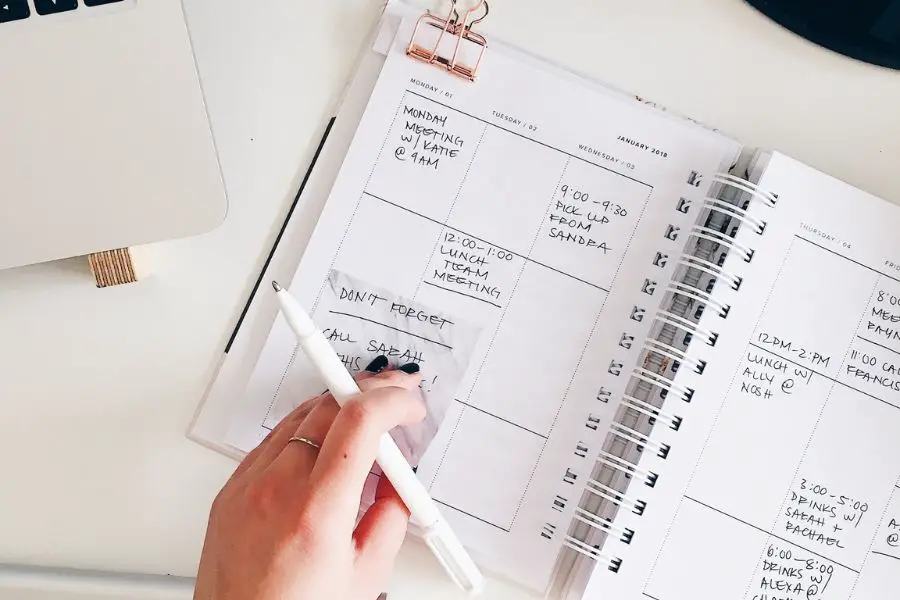Are you looking for the best tips and hacks to help you smash your student study goals? Here are my top 20 tips to help you smash your study goals.
According to recent research in the UK by the student charity NUS, nearly a third of undergraduate students struggle to keep up with their study goals.
Whether it's due to a lack of motivation or difficulty focusing on the task at hand, achieving success in student studies often requires a little extra effort and dedication!
That’s why I've come up with these top 20 student study hacks that will help you reach your academic goals faster and more effectively.
From creating a daily plan of action to using tech tools to manage your time better. These tips are sure to give you an edge when it comes to hitting your study goals like a boss!
This post is all about student study goals.
STUDENT STUDY GOALS
Smash your student study goals with these Top 20 hacks:
1. Set achievable goals
This is number 1 on my list and is probably one of the most important things to do!
That is to make sure you set realistic student study goals that will allow you to reach your objectives without feeling overwhelmed or frustrated.
By being too ambitious you are more likely to avoid your study session, which can cause a backlog and lead to a downward spiral!
For your study goals to be achievable, you must first have measurable goals. Meaning you should be able to track them using the appropriate metrics or targets and tick them off when you have achieved them.
Try implementing the SMART goals method of studying. As the saying goes 'study smarter, not harder'.
As university/ college students you need to set SMART goals during your school year.
What are the requirement for setting a S.M.A.R.T Goal?
- Specific- Is your goal clear enough?
- Measurable- Can you measure and track your progress?
- Achievable- How will you know when you have achieved your goal?
- Realistic- Is this goal realistic to achieve or relevant to your higher education or career?
- Time-Bound- Do you have a deadline for the completion of your goal?
Example of how to set goals that are S.M.A.R.T
GOAL: I will get an A (1:1) in my current essay/ assignment for my contract law module on 'how contracts are formed' in my Law course.
- Specific- The specific class I want a higher grade in is my Contract Law module and the specific essay/ assignment is my current one on 'how contracts are formed'.
- Measurable- The measurement of success is getting an 'A- or above' (1:1) grade in the essay/ assignment.
- Achievable- I got a B (2:1) in my past essay/ assignment so it's easy for me to believe I can increase my grade level by one grade by putting more effort into it and learning from the feedback I received last time.
- Realistic- The goal of getting an A in this essay/ assignment is realistic and relevant to my long-term goal of graduating from my Law course with a First Class degree.
- Time-Bound- The time frame for my essay is due in 6 weeks by 4pm.
Check out my article on how to set SMART Goals below:
48 Good SMART Goals for Teens: Students Guide to Set Effective Goals
2. Break down big projects into smaller tasks

What is a Student Learning Goal // Photo by Daria Nepriakhina 
Breaking larger assignments down into manageable tasks allows you to focus on one part of the project at a time and keeps things from feeling overwhelming.
You will be able to meet goals easier when you have a better understanding of the assignment.
If you're struggling with any part of your assignment, go see the faculty members that have knowledge of the subject area you're struggling with.
3. Create a study schedule

Student Study Plan Example // Photo by Marten Bjork on Unsplash
This one sounds quite obvious, but scheduling a specific time to study each day helps you stay on top of your student study goals and allows you to plan for any tests or projects.
You may need to tweak it some days but that's ok. If you have a basic structure outlined then you will be able to see if you have to put in any extra study time if you are taking time out.
Having a study schedule will help you achieve your most important goals and improve your odds of achieving your overall goal.
Which for most students is acing your exams and graduating with the highest degree you can get.
I know when it came to me planning my goal setting and what I wanted to achieve from my degree program. Creating a study schedule played a huge part in achieving it.
And yes, I did achieve it. I graduated from my University with a First Class Law Degree.
I believed I could achieve it and then I did!
“Whether you think you can, or you think you can’t – you’re right,”
- Henry Ford
4. Make the most of technology
Take advantage of the tools available through apps, websites, and other technologies that can help you manage your student study goals more effectively.
A couple of my favourites are Quizlet and Anki. Download the app and give them a go.
I know we live in a distracted world, especially with the rise of social media. Above all, if you want to achieve academic success, you have to work hard.

Student Learning Goals Example // Photo by Kevin Bhagat on Unsplash
Don't confuse studying SMARTER not HARDER with hard work. The two are miles apart. Everything worth doing requires hard work, not just for student achievement or career advancement, but also in life.
Your smartphone can be the cell that keeps your mind in prison (scrolling endless social media platforms). Or it can be the key that sets you free and unlock a great resource (more time) that propels you forward.
If this sounds too challenging to you, then you need to work more on your academic discipline. Nobody spends a 'reasonable amount of time' on social media, that's why people call it 'endless scrolling'.
As a student, you don't have much time to waste.
It's not just the tool, it's HOW you use it.
5. Practice makes perfect!
Here's something that may astound you; after we learn something new, as much as 70% is forgotten within only 24 hours according to scientists!
It's called the 'Forgetting Curve'. However, if we keep practising and recalling the information, it will help enormously when trying to remember what we’ve learned!
This could be done by taking a practice exam paper, writing an essay under timed conditions, or studying with flashcards.
No matter which method you choose, actively engaging with the material will help those memories stay locked into your brain for good!
6. Track your progress
Keeping a log or chart of your student study goals can help you stay on track by allowing you to monitor and adjust as needed. This is an important aspect of setting student study goals.
Being able to see your goals clearly can help you to stay on track and also adds to your motivation. So it's best to place them in clear view where you can see them every single day.
For example, blue-tac a sheet of paper on your wall or put some sticky notes up.
You may have many different types of goals, so take smart stands and keep track of them. Especially as you a add new goal to the mix.
It's a good idea to track your progress when setting goals.
Whether you have short-term goals such as getting good grades in your current modules or long-term goals such as getting a high-paying entry-level job after you graduate.

What are Academic Goals for Students // Photo by Green Chameleon on Unsplash
The goal-setting process is not as hard as younger students make it out to be. The trick is to set a specific goal, starting with setting x1 long-term goal.
Also, a few short term goals to help you get to the long term goal. It has to be a realistic goal based on what you want to achieve.
For instance, a long-term goal is to graduate from University with a First Class or a 2:1 degree.
The short-term goals you set should ultimately get you to the long-term goal. An example of a short-term goal should be getting a higher grade in your current modules.
Then you break that down further and start thinking about how you can improve your grades.
Think about the steps you can take to get a high grade in each seminar, each essay and each assignment you will be graded on moving forward.
A good way to keep track of your grades is by using a grade tracker. Track the grades you got in the past, and the ones you're getting now.
Then re-evaluate your action plan at the end of the month and then again at the end of every semester. To prepare yourself for the next semester ahead.
By the end of this course, you will know if you achieve your student study goals or not.
7. Eliminate distractions
This is one of my go-to hacks! Turn off any devices or notifications that could be disruptive while studying, and find a quiet spot with minimal interruptions.
I do this by putting my phone in 'sleep mode', which means that nothing comes through. I do make an exception for repeat callers in my phone settings.
Just in case a family member or friend really needs to get in touch with me in case of an emergency.
Being able to concentrate properly is crucial when you want to smash your study goals with these top 20 hacks!
8. Ask for help when needed
Don’t be afraid to reach out and ask for assistance if you feel like you need it — this could mean seeking guidance from teachers, tutors, friends, or family members.
Most people will be more than willing to help you. Even if they just confirm what you thought already! it can help to have someone to bounce off.
Use your professor's office hours to ask any questions you have, if you don't want to ask during or after lectures and/ or seminars.
Honestly, if you need help with your student learning and students' progress then you should be utilising your professor's knowledge and experience.
Your teachers are ALWAYS happy to help you. It's a total myth when students think their teachers don't care enough, it's often the other way around. So don't be shy just go ask for some help.
It would be a mistake to suffer in silence. Try not to get into that mindset of 'i've got time' and that you have to figure it all out by yourself. That's simply not true, everyone needs help now and then.
9. Go to your study zone with music!
If you want to be productive, always bring headphones with you! Some people like music while others might love the sound of rain or the gentle noise of a coffee shop in the background.
When you listen to the same songs or binaural beats every time you sit down to work, your mind will automatically slip into productivity mode.
Create a playlist that helps get you into "the zone," your productivity will thank you later!
My study music was made up of either music with no lyrics or just static sounds.
10. Take notes
Note-taking is a great way to reinforce information as you’re studying, track progress, and review the material later on.
It also helps to highlight any areas where you could use more practice or need additional help.
For more help on taking notes, head over to my other helpful articles:
8 Secret Techniques To Improve Note Taking- Apply These Now!
Note-Taking Shortcuts – The Easy Way
12 Awesome Ways to Take Study Notes When Reading
11. Find an accountability partner
Having someone who shares similar student study goals can be incredibly helpful in keeping each other motivated and staying on top of tasks!
A great idea is to host a mini get-together for students on your course, cook some food and hook up with some like-minded friends who are working on the same assignments.
That way you'll both stay on track and have some company while you are studying! make the food simple and of course, budget-friendly! so head over to discover 21 Easy Cheap Student Meal Ideas You Need To Try
12. Create a timeline: Smash your study goals with these top 20 hacks
When we write down deadlines, according to research by Dr Susan Weinschenk (a psychologist and expert in human behaviour), it helps us to become more focused on the goal itself.
Creating a timeline for yourself will help you break down your student study goals into smaller, manageable chunks that are easier to complete.
Include milestones and deadlines along with any breaks or rewards in your timeline so that you can keep up motivation levels and celebrate successes!
13. Set reminders
When we’re trying to stay on top of student study goals, sometimes all it takes is a gentle reminder to get us going again.
Set reminders on your phone or calendar app which pop up at regular intervals throughout the day.
That way if you forget something important, Break down large student study goals into smaller chunks by establishing deadlines for yourself throughout the year.
This will make it easier to keep track of all the tasks you need to complete.
I don't need to tell you when you're a student time management is everything!
14. Stay organised
This seems fairly obvious but creates an organisational system that works for you — whether it’s digital or physical — to make sure all relevant materials are at your fingertips when needed.
An important skill to learn is labelling all your notes and keeping your paperwork together and organised by dating them and writing the name of your classes on them.
This will make it so much easier to find what you're looking for when it comes to reviewing your notes.
15. Make use of student resources
Many universities offer student-teacher relations programs and other student-study goal-oriented services, so take advantage of these if available!
These resources are there to help you stay on track and reach those student study goals faster than ever before!
16. Avoid ‘cramming’
Marathon cram sessions have become all too common in everyday student lifestyles! They may seem like the only way to get everything done, but they’re actually quite inefficient!
You retain very little of what you try to learn in one of these cramming sessions, and the crash afterwards doesn’t do you any favours either.
Commit to spreading your study over a prolonged period – it will be worth it in the end. A healthy balance and a normal life are important for students who want to smash their study goals.
Remember: Cramming last minute is never a good idea if you want to remember the information for a long time.
17. Take regular breaks
Taking a break every hour or so can really improve your focus by helping to reduce fatigue and stress levels.
It also allows you to take a step back, refresh your senses and get back into the zone quickly when you return to studying.
Find out more about why looking after your well-being is soo important when at Uni.
Why Is Student Well-being Important? 5 Ways To Get Energised!
18. Join a study group
Studying with other students is a great way to stay motivated and keep track of student study goals while helping one another understand difficult concepts better.
Similar to an accountability partner, learning in groups will keep you on track and motivated to complete your student study goals.
19. Know your study style
It is essential to understand which study techniques work best for you and will help you power through your study goals!
For example, if you are a visual learner, studying with diagrams, charts or colour-coding can be very helpful. If you are an auditory learner, audio notes may suit you better.
Knowing what works best for you can help take your study success to the next level!
For example I am a visual learner. I took the self-assessment test and here are my results.
20. Reward yourself
Rewarding yourself after achieving student study goals can be beneficial in helping motivate and push yourself further.
This helps create positive reinforcement and gives you a fabulous feeling of achievement which is so important when smashing your study goals!
Don't forget to make personal goals for yourself. Everyone wants to do well in their university/ college career and so focus on their near future career path.
So don't miss out on what the modern world has to offer you.

What are the Goals of a Student // Photo by Elevate on Unsplash
Having your own goals whether short term goals or long term goals, is something to strive for to make your life better and more fun.
For example, learning to drive a car, or finding a part-time job. Even something as simple as going to the movies with your friends can be fun and rewarding.
These are good goals to have alongside your professional goals.
I am committed to lifelong learning, so I'm hoping these top tips are helpful for your individual needs and help you set your specific knowledge goals based on whatever course you're studying.
Extra student study goals to focus on to improve your grade level

Student Goals for College Students // Photo by Cathryn Lavery on Unsplash
These are where the high marks are, so for long-term success you should definitely set these course goals and meet them:
- Critical thinking
- Analytical skills
- Course-based learning goals / learning objectives
- Communication skills
Final thoughts on Student Study Goals...
Remember: smashing your student study goals isn't just about how much information you can memorise or how many hours you spend studying; it’s about taking the right approach and staying organised and motivated.
For more tips head over to the Study Smart area of my blog.
With my top 20 student study hacks, you can work smarter, and you’ll be one step closer to nailing your exams like a boss. Good luck!
This post was all about student study goals to help you smash your academic goals.
SAVE THIS PIN OR BOOKMARK THIS PAGE FOR LATER!










